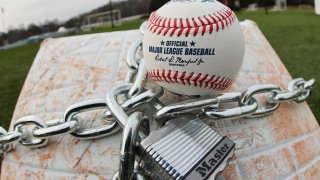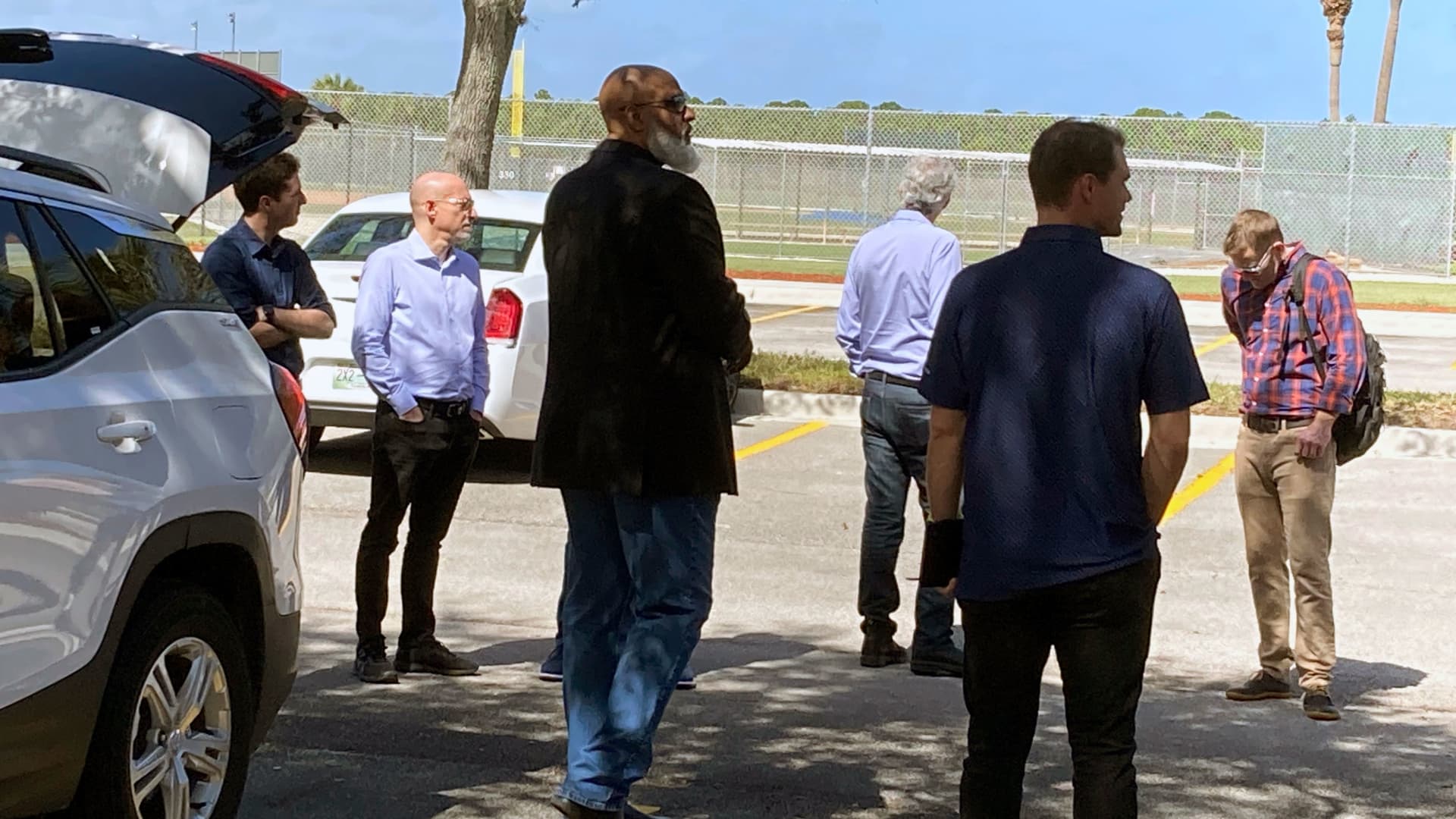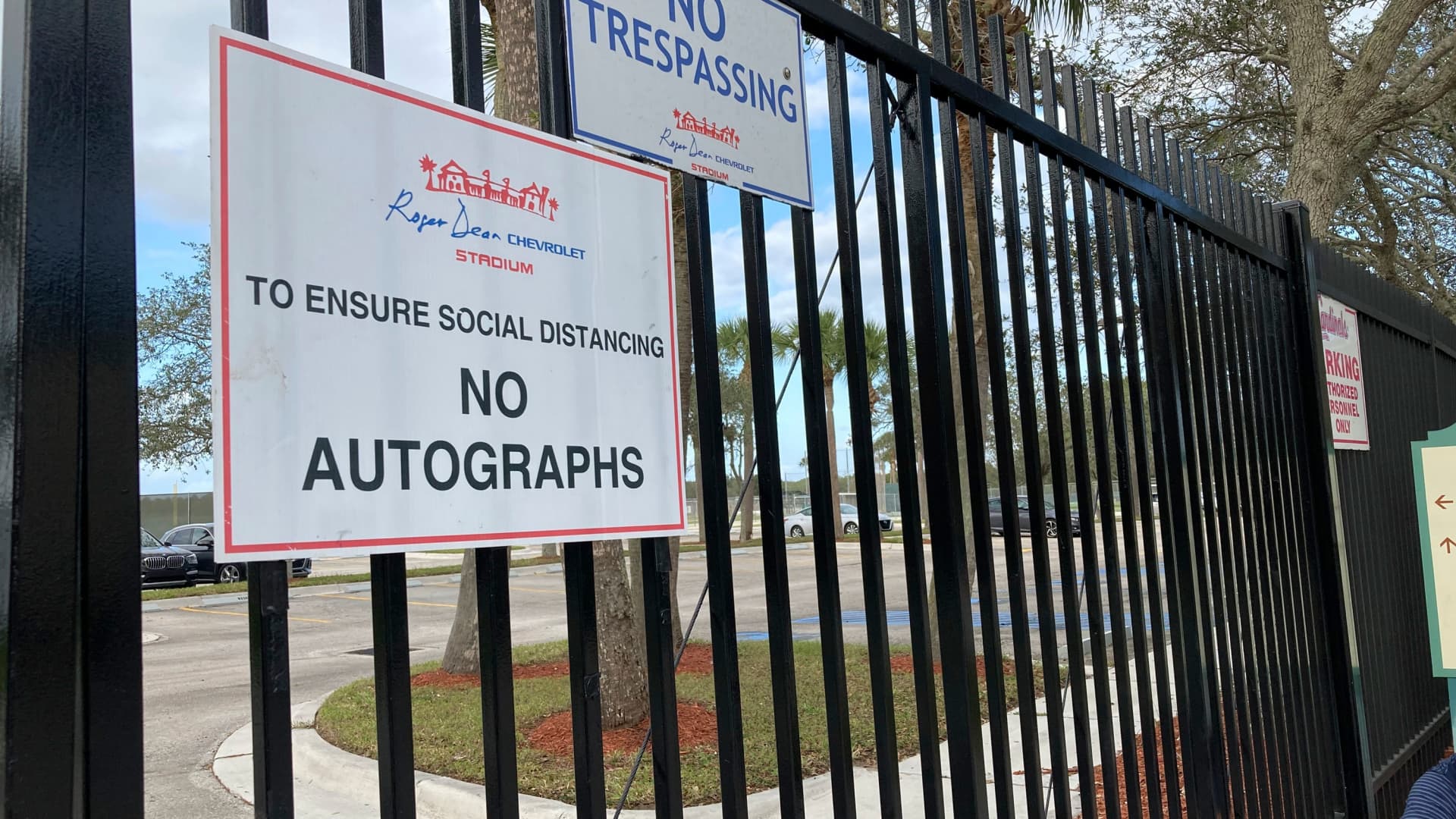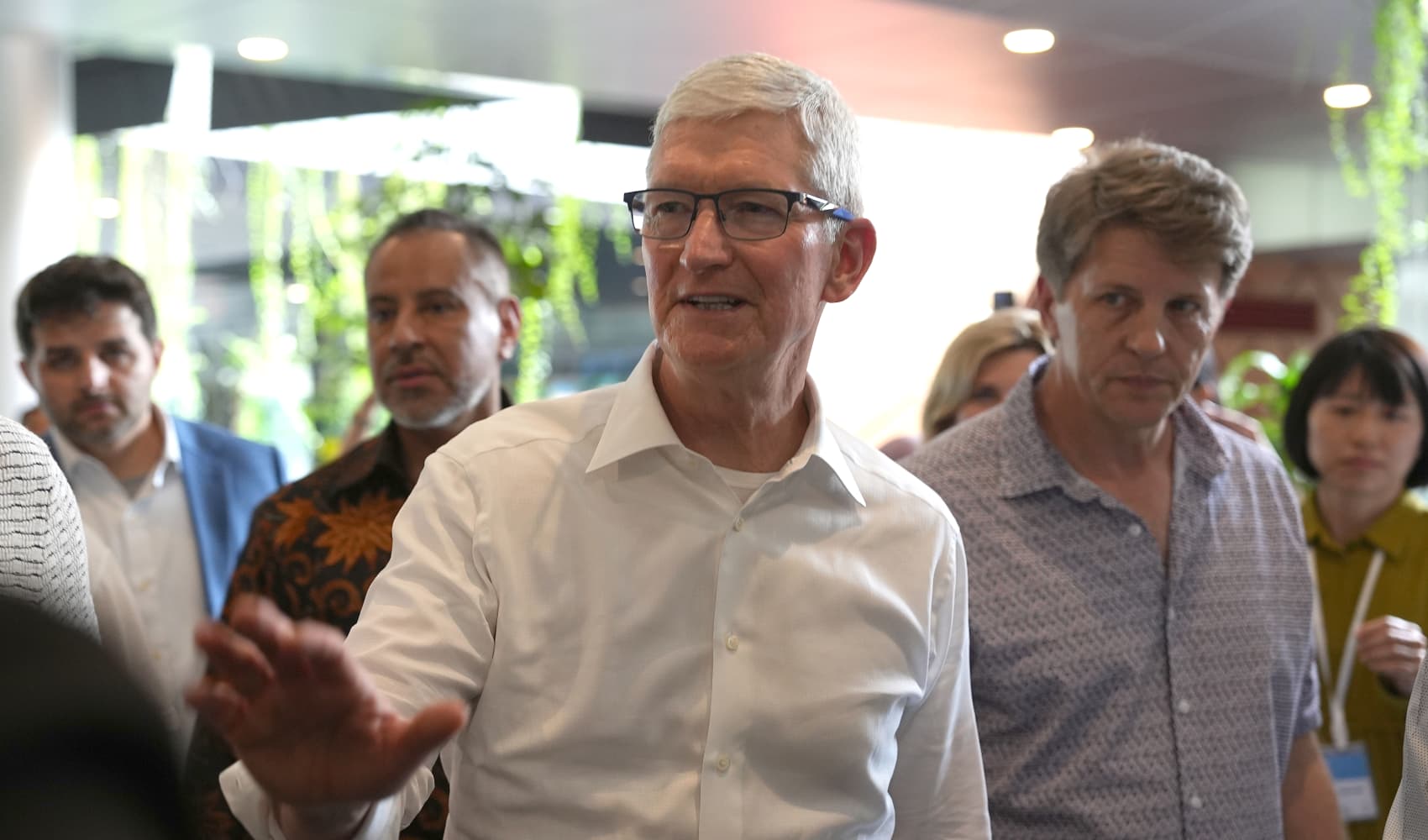
- Major League Baseball representatives and players union officials are set to negotiate through the weekend as the lockout persists.
- Owners set a Monday deadline for a deal. Otherwise, they plan on delaying Opening Day, which is currently set for March 31.
- Regular-season games could be canceled, players wouldn't be paid for the full 162-game season, and it could all add up to a disastrous development for MLB's business.
Major League Baseball and the players union are approaching the ninth inning of their labor standoff. And extra innings in this case would mean less baseball, not more.
Owners set a Monday deadline for a deal, otherwise they would move to delay Opening Day, which is currently set for March 31. Talks, which are being held at the St. Louis Cardinals' spring training complex in Jupiter, Fla., are expected to continue through the weekend.
The two parties remain at odds over ways to restart the $10 billion business. MLB owners, who initiated the lockout Dec. 2, want only minimum changes to the current collective bargaining agreement. The players have other ideas on ways to earn more money.
Get a weekly recap of the latest San Francisco Bay Area housing news. Sign up for NBC Bay Area’s Housing Deconstructed newsletter.
Regular-season games could be canceled, players wouldn't be paid for the full 162-game season, and it could all add up to a disastrous development for MLB's business.

'Lack of relationships'
Money Report
"Very publicly, at least on the PA side, the lines were drawn early," said former MLB executive Marty Conway, referring to the MLB Players Association.
Now a sports business professor at Georgetown University, Conway served as an executive under former MLB Commissioner Pete Ueberroth. Conway blamed the tension in these labor talks on a "lack of relationships" among the MLB and the players union.
"They (players) felt the last two labor agreements – so you're talking about 10 years – there wasn't an equality or an equity part of it," said Conway. "That told me that the new folks coming in (executive director Tony Clark and the new chief negotiator Bruce Meyer) are there for a reason – to make changes."
The jabs started early between MLB Commissioner Rob Manfred and Clark. The two couldn't see eye-to-eye on ways to start MLB's 2020 season as the world grappled with Covid. That resulted in a 60-game campaign. MLB saved a big piece of its national TV money after completing the postseason and World Series. But players missed out on full salaries during the 2020 season.
In 2018, MLBPA filed a grievance and accused MLB teams including Miami, Oakland, and Pittsburgh of not spending the shared revenue on players, which is against the rules. Add in the frustration of declining salaries, and how executives now run clubs;
Last November, Meyer, the players' chief negotiator, sent a strong message.
"Players feel like the system has gotten out of whack and really gone too far in favoring the owners," Meyer told The Atlantic. "The system isn't operating really the way it was traditionally intended to operate. And that's in part because of the groupthink that we see in front offices and analytics."
The resulting talks have been contentious. Spring training games have already been canceled through March 8. The Feb. 18 bargaining sessions lasted only 15 minutes. And the media leaks around economic proposals persists.
The union wants changes to MLB's arbitration system to get players paid sooner. Currently it takes up to six years before some players are completely free of club control — a rule that MLB owners want to retain.
A recent collective bargaining agreement had MLB and the union more than $130,000 apart on minimum player salary. The previous CBA set MLB's minimum salary at $570,500. The players union seeks to push that number to a flat $775,000 minimum. MLB proposed $600,000, then $615,000. This week, it increased it to $640,000.
In exchange for more money, a revamped draft lottery system to address tanking, and a universal designated hitter for both the National and American leagues, which would result in more jobs, MLB owners want more to increase the teams playing in the postseason to 14 teams from 10.
Conway called these issues "big-ticket areas." Revenue sharing among teams and service time is "how the game functions today," he said.
"I understand what the players are seeking here, but they're pretty substantial changes," Conway said. "I don't know if they are prepared to not get all of that this time."
Conway doesn't think owners are bluffing with their Monday deadline.
"I don't think they are. They took it down to 60 games two years ago," he said. "So, in that regard, I think they have a real good understanding of where their profit and loss sits."

A disaster for other parties, too
Missed games would also harm media partners. Deals with ESPN, Turner, and Fox are scheduled to start for the upcoming 2022 season and will pay MLB roughly $1.8 billion annually over this decade.
ESPN has the most significant amount of regular-season inventory on the national networks because of its Sunday Night Baseball package. And Turner Sports is also scheduled to debut a weekday game. The thing is, most of the national TV money comes from postseason and World Series games.
Regional sports networks will suffer the most. If MLB games are delayed, already weakened RSNs worry about owing distributors and providing make-good inventory to advertisers. One network executive told CNBC marketers are ready to put money into local MLB games but waiting for a resolution to labor talks to get an idea of total inventory.
It's unclear how many games MLB must provide RSNs to meet contractual obligations as each market is different. But RSNs are important because they give MLB the majority of its viewership during the season.
Also, local fees are vital for MLB clubs, including top market teams like the New York Yankees, as clubs have ownership stakes in RSNs. The Yankees repurchased its local RSN from Disney in August 2019 and Yankees paid about $3.4 billion to regain the YES Network, and the team added Amazon as an investor.
The way this goes: MLB teams would return money to RSNs, who would owe distributors. And if no games are played, consumers could seek refunds from distributors. We saw this play out during the pandemic.
MLB will surely suffer on the attendance front, too, as clubs will miss out on gate and concession revenue. MLB drew a total of 45.3 million fans last season, partly due to restrictions around the pandemic. Still, it's down from 68.5 million in 2019. And it's a steeper decline compared to MLB's record-high 79.5 million fans in the 2007 season.
For an example to how important attendance still is to MLB, clubs suffered massive layoffs due to lack of gate receipts during the pandemic. And Tom Ricketts, chairman and co-owner of the Chicago Cubs, projected a $4 billion hit to MLB's roughly $10 billion revenue with no fans.
"I see missing games as a disastrous outcome for this industry," Manfred told reporters on Feb. 10. "We're committed to making an agreement in an effort to avoid that."

Will MLB bounce back?
In that same press conference, Manfred said MLB is "doing everything we can to get a deal done for our fans." He also noted that he's "the only person who has made a labor agreement without a dispute – and I did four of them."
"Somehow, during those four negotiations," Manfred added, "players and union representatives figured out a way to trust me enough to make a deal. I'm the same person today as I was in 1998 when I took that labor job."
Whether Manfred can once again be the closer in the bottom of the ninth, avoid losing games, and deliver a deal on his commissioner's watch remains to be seen, though. And he'll will also need to fix MLB on the field to make the game more watchable and exciting.
MLB wants things such as a pitcher's clock to speed up games. Manfred also tried new concepts during the pandemic like starting extra innings with a player on second base. And the league already installed a three-batter rule, designed to decrease game delaying pitcher changes.
That's what fans care about.
"It is not money," longtime baseball writer Thomas Verducci wrote in Sports Illustrated. "It is the product. Baseball's place in popular culture and the entertainment landscape is threatened by how it is played, not its economic structure."
And the longer the league and players wait to fix MLB, it risks losing more paying consumers who are grappling with economic pressures such as high inflation.
"Baseball has been resilient in a lot of ways," Conwy added. "The question is, how high does the ball bounce back this time? A lot of people will move on. And some people will say, 'I'm paying $4 a gallon for gas. I can't afford baseball.'"






